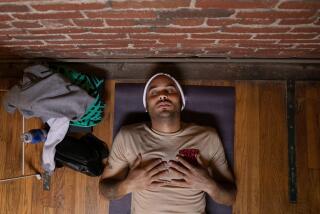Helping MDA, Hope Hits Close to Home
- Share via
“Mommy, how close are they to a cure? Show me with your fingers! Show me with your fingers!”
It’s a question little Scotty Brown loves to ask his mother.
“This close! This close!” Joann Brown answers, cupping her right hand and holding her thumb and index finger an inch apart.
Scotty, 7, and his brother, Jeffrey, 9, both have Duchenne muscular dystrophy, a fatal disease that causes progressive weakening of the muscles.
Joann has finally gotten to the point where she can smile when she talks about it.
“I truly believe a cure is right around the corner,” she said in her Mission Viejo home. “I have only two children, and both have been struck by this deadly disease. So all of my efforts--I don’t work--go toward helping to raise research money to find a cure.”
On Aug. 19, Joann, her husband, Mark, and their two boys will attend the “Fantasy by the Sea” benefit on behalf of the Muscular Dystrophy Assn. of Orange County at the Waterfront Hilton in Huntington Beach.
“I help support the MDA because it is the backbone of the cure movement,” Joann said. “It’s where all of the hope is.”
The grief and despair she experienced when the boys were first diagnosed with Duchenne MD has passed, she says. “But every time their bodies change, I don’t sleep at night. I think: ‘How am I going to cope with this? How am I going to have two kids in wheelchairs?’
“Jeff is totally dependent now. He can’t go to the bathroom alone, or brush his teeth. He can still feed himself. But he doesn’t have the strength to lift things. If a glass is too heavy, I give him a straw.
“Scotty has been so lively, people wonder if he actually has muscular dystrophy. But this past year, you know he has it. He can hardly get off the floor . . . it’s deja vu , you know?”
Duchenne MD affects one out of every 3,500 males. It is caused by a defect in the gene that makes dystrophin, a protein that prevents muscle tissue from breaking down. Duchenne MD causes progressive weakening, leading to paralysis and death from heart or respiratory failure, usually by the time a patient is in his mid-20s.
“I am hoping the day will soon come when they will be able to inject (into my children) a gene that can make dystrophin,” Joann said.
(Last year, research scientists injected a dystrophin gene into mice destined to develop a Duchenne-like MD and found that all signs of the dystrophy disappeared. The experiment at the University of Michigan was considered promising.
Says Jim Brown, MDA director of public affairs: “Both the prevalence and severity of Duchenne muscular dystrophy give cause for real concern. Any family that suspects the illness can call our toll-free line ((800) 572-1717) to get information and assistance free of charge.”)
Meanwhile, as a member of the planning committee for the “Fantasy by the Sea” event, Joann will continue to work on behalf of the MDA, securing auction items such as this year’s “Wolf” movie posters signed by her old beach pal, actress Michelle Pfeiffer.
Those were the days. When Mark and Joann were in their teens, they used to hit the sand at 17th Street in Huntington Beach with Pfeiffer, who was a beauty even then.
“We watched her go on to modeling, beauty contests and acting,” Joann said. “And about two years ago, through the MDA, a girlfriend and I contacted Michelle--her sixth-grade class wrote her a letter--and invited her to support MDA.
“Later, I wrote her. I didn’t think she would remember me. But she wrote me back, told me, of course she remembered me. I should frame it.”
Pfeiffer’s name is on the party invitation as an honorary committee member. “A name like Michelle’s gets people to pay attention,” Joann said. “People think, ‘Wow! Here’s a hotshot, a worldwide celebrity, and she even takes time to care about a local MD event.’ ”
It’s pals like Pfeiffer, a supportive husband like Mark and groups such as MDA that keep Joann going. “The boys are happy,” she said. “They are fine. They were born on this street. Their friends have seen Jeff go from walking to a wheelchair.
“Kids come knocking at the door, begging them to play. Parents pick up Jeff and put them in their pool, take him inside their homes.
“Life is good here. The boys are supported. Of course, they’re different. Flat out, they’re different. There’s no way possible they will be the same as other children.
“But as long as we can make them feel accepted and loved and do as many normal things as possible, we will be fine. I have dedicated my life to taking care of them.”
More to Read
Sign up for Essential California
The most important California stories and recommendations in your inbox every morning.
You may occasionally receive promotional content from the Los Angeles Times.













